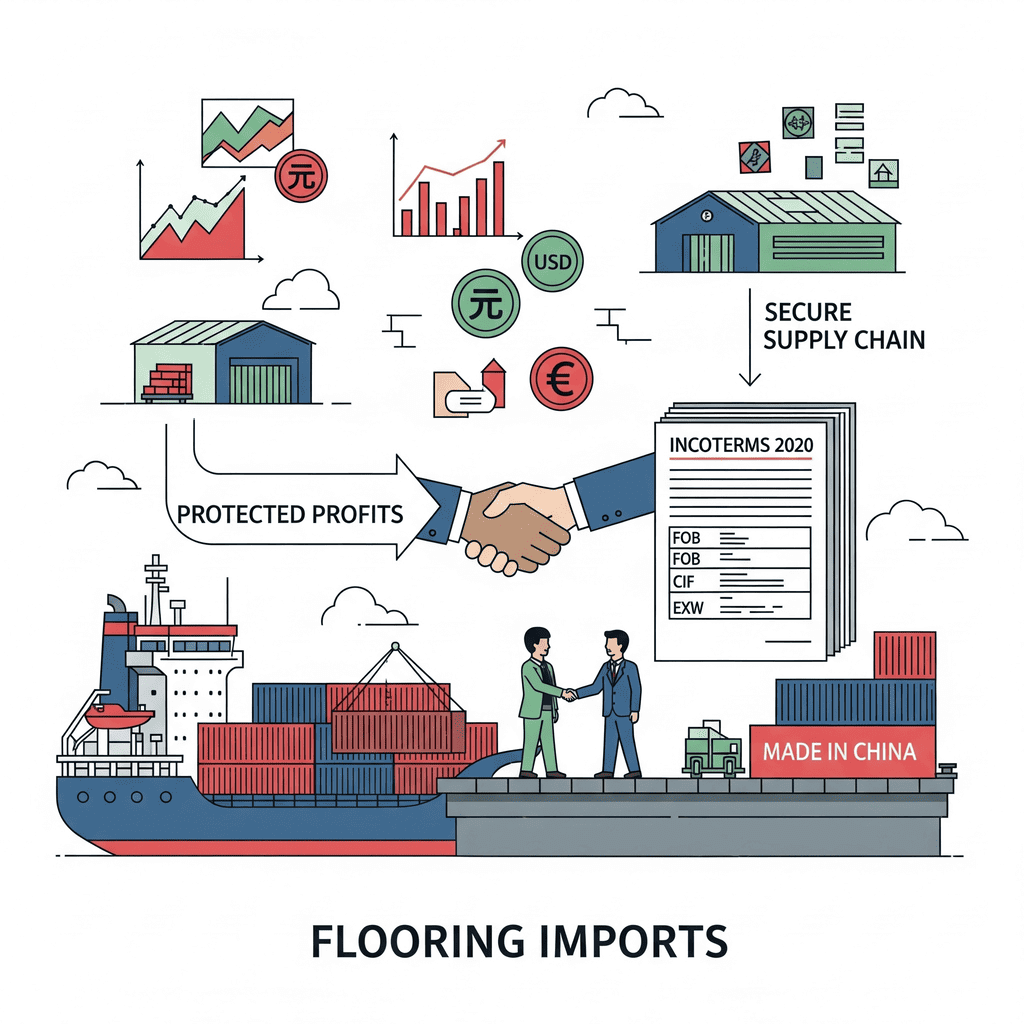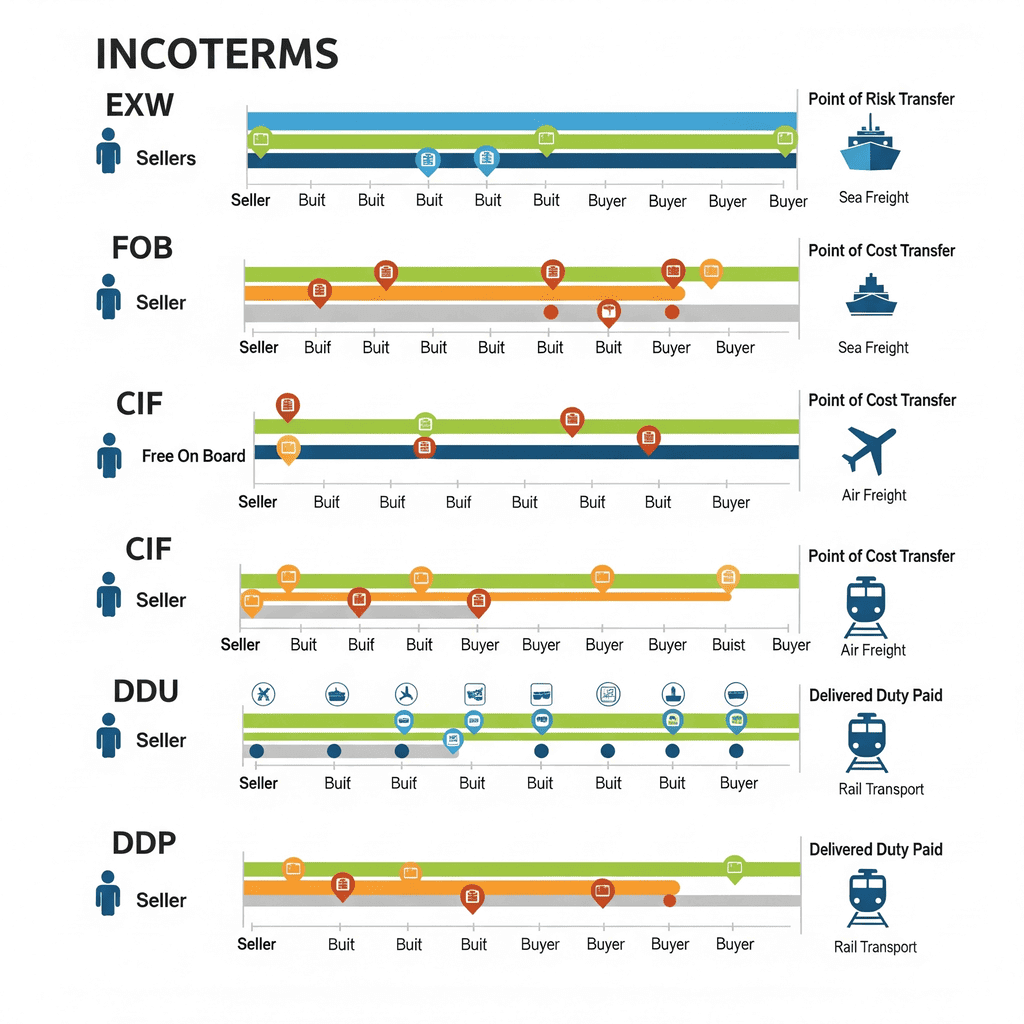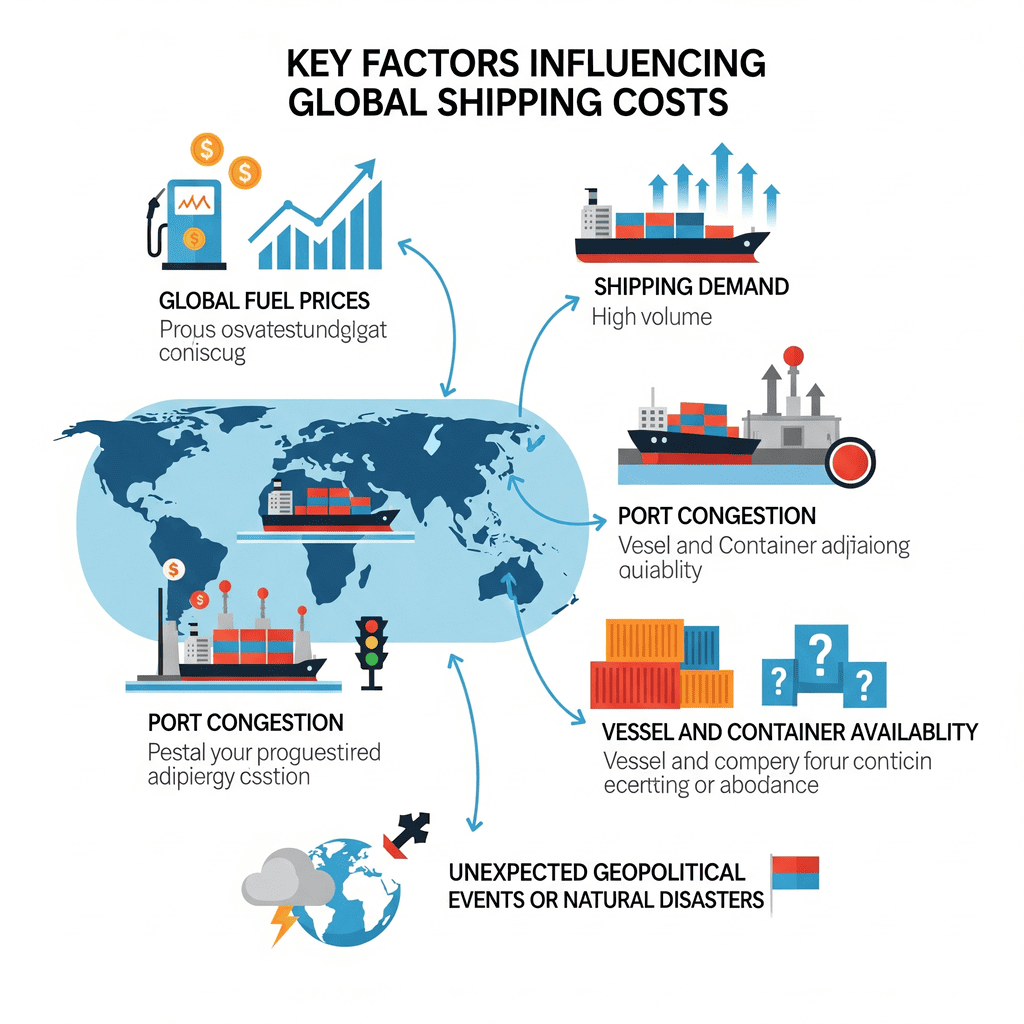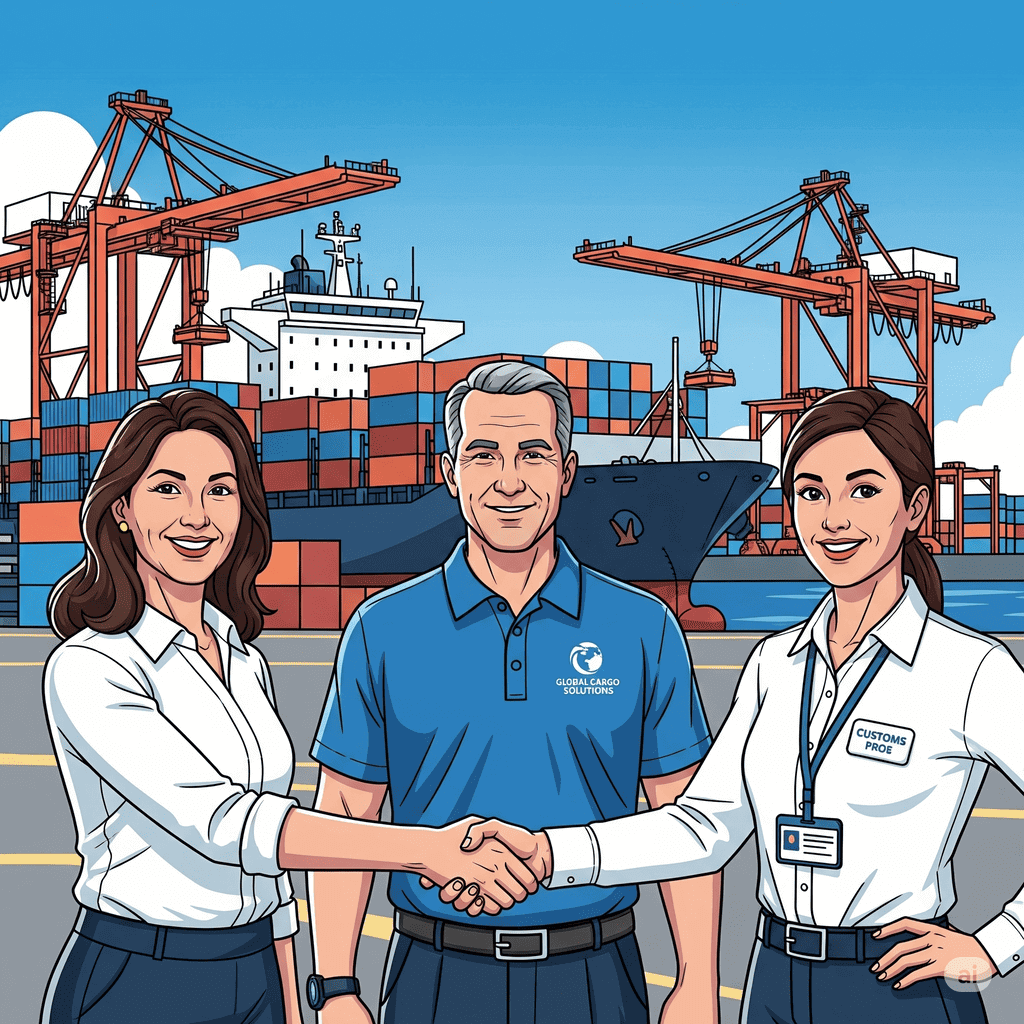Logistics for importing flooring can feel like a maze. Unexpected delays and hidden costs often derail your plans. Learn how to navigate these challenges for smoother, more profitable imports.
Making your flooring imports efficient from China relies on understanding key elements: choosing the right Incoterms, anticipating ocean freight fluctuations, and partnering with experienced freight forwarders and customs brokers. These steps secure your supply chain and protect your bottom line.

At CloudsFlooring, I see firsthand the struggles buyers face with logistics. Many of our clients, like Aiden in the UK and Lori in the US, want top-quality flooring but also need to keep costs predictable. They demand smooth operations, and that means getting the shipping right. Let’s break down the most important considerations.
Choosing the Right Incoterms: How Critical Is It for Managing Costs and Responsibilities?
Picking the right Incoterms can seem like a small detail. Yet, the wrong choice can lead to massive headaches, unexpected expenses, or even legal disputes. Understand how to make the best decision for your business.
Choosing Incoterms like FOB (Free On Board) or CIF (Cost, Insurance, and Freight) is absolutely critical for managing your costs and responsibilities when importing flooring. These terms clearly define who pays for each part of the journey and when the risk of loss or damage transfers from seller to buyer.

Understanding Incoterms Basics
When you buy large volumes of flooring, like SPC or LVT, from China, Incoterms are not just jargon. They are the rules of the game. They set out exactly who pays for what and who is responsible for the goods at each stage. They clarify who handles transport, insurance, and customs at various points in the journey. Ignoring these details can lead to unexpected costs. For example, if you think the seller handles transport to your door, but the Incoterm says you are responsible from the port, you will face surprise charges upon arrival. This can easily impact your profit margins, especially on large orders.
Common Incoterms for Flooring Imports
EXW (Ex Works) means I, as the factory, just make the goods available at my CloudsFlooring factory door in China. You, the buyer, are then responsible for everything else. This includes loading, local transport in China, export customs clearance, ocean freight, import customs, and final delivery to your warehouse. This term gives you maximum control. However, it also means you take on maximum responsibility and risk from the very start.
FOB (Free On Board) is very common for our clients from North America and the UK. With FOB, I, as the seller, am responsible for getting the flooring to the port of shipment in China. I also handle loading it onto the vessel and completing all export customs formalities. Once the goods are on board the ship, the responsibility transfers to you. This means you control the main ocean freight. This can help you get better rates from your own chosen forwarder.
CIF (Cost, Insurance, and Freight) means I, as the seller, arrange and pay for the freight and insurance to your named port of destination. Even so, the risk still transfers at the port of origin, when the goods are on board the vessel. This is a common point of confusion for buyers. You pay for the shipping costs, but you bear the risk if anything happens after the goods leave my factory.
Two other important terms are DDU (Delivered Duty Unpaid) and DDP (Delivered Duty Paid). With DDU, I, the seller, arrange and pay for the transport of the goods to your named destination. You, the buyer, are responsible for customs clearance and paying any duties and taxes at your destination. With DDP, I, the seller, handle everything, including delivering the goods to your final destination, clearing customs, and paying all duties and taxes. This term gives you the least responsibility.
Risk and Cost Transfer Points
Understanding these differences is key to avoiding unforeseen costs or problems. My clients like Aiden and Lori, who are sensitive to quality and price, need to know these details. It helps them ensure they get the best deal without hidden surprises. The point where responsibility and risk transfer is crucial. It dictates when your insurance coverage should begin and who pays for potential damages or losses during transit.
Here is a simple breakdown of common Incoterms and their impact:
| Incoterm | Seller’s Responsibility (CloudsFlooring) | Buyer’s Responsibility (You) | Risk Transfer Point |
|---|---|---|---|
| EXW | Making goods available at factory | All transport, customs, risk | Factory Gate |
| FOB | Export customs, loading onto vessel | Ocean freight, import customs, delivery | On board vessel at origin port |
| CIF | Ocean freight, insurance to destination port | Unloading, import customs, delivery | On board vessel at origin port |
| DDU | Transport to named place of destination | Import customs, duties, taxes, unloading, delivery | At named place of destination (before customs clearance) |
| DDP | All transport, customs, duties, taxes, delivery | Unloading at final destination | At named place of destination (after customs clearance) |
Ocean Freight for Flooring Containers: What Factors Influence Rates and Transit Times?
Ocean freight rates can seem to change daily, and transit times are hard to predict. This uncertainty can ruin your profit margins or make you miss crucial sales seasons. Knowing what drives these changes helps you plan better.
Ocean freight rates and transit times for flooring containers are influenced by several key factors. These include global fuel prices, overall shipping demand, port congestion at origin and destination, the availability of vessels and containers, and unexpected geopolitical events or natural disasters.

When you are looking to import SPC or LVT flooring, the cost and speed of getting your container across the ocean are major concerns. I often explain to my clients that several things can make ocean freight rates1 go up or down.
Key Drivers of Freight Costs
Fuel prices are a big one. If oil gets more expensive, so does shipping. Global demand for shipping space also plays a huge role. If many companies are trying to send goods at once, prices will naturally rise because there is less space available. This was very clear during the past few years when demand spiked.
For example, during the peak of the pandemic, container rates from China to the US increased by over 500% in some lanes. Port congestion is another critical factor. When many ships arrive at a port at the same time, vessels might have to wait for days or even weeks to unload.
This directly impacts transit times and can lead to extra charges like demurrage or detention for delayed equipment returns. A typical wait time could add 5-10 days to a journey.
Vessel and container availability also matters. If there are not enough ships or containers to meet demand, rates go up. My factory, CloudsFlooring, always advises clients to book shipping space early, especially during peak seasons.
Here is how common factors influence ocean freight:
| Factor | Impact on Rates | Impact on Transit Time | Notes |
|---|---|---|---|
| Fuel Prices | Directly increases/decreases | Minimal direct impact | Bunker Adjustment Factor (BAF) on invoices |
| Shipping Demand | High demand = Higher rates | High demand = Potential delays (port congestion) | Seasonal peaks (e.g., Q3, pre-CNY) |
| Port Congestion | Can increase surcharges | Significant delays (days/weeks) | Common in major import hubs (LA, Felixstowe) |
| Vessel/Container Availability | Shortage = Higher rates | Shortage = Booking delays | Impacts ability to get space at all |
| Geopolitical Events | Volatile rates, rerouting | Major delays, route changes | Wars, trade disputes, canal blockages |
Impact of Global Events and Seasonality
Peak seasons usually happen before major holidays like Chinese New Year, Golden Week in October, or leading up to Christmas in North America and the UK. During these times, transit times can increase by 1-2 weeks, and rates can jump by 20-30% in a month.
Planning your orders around these periods can save you significant costs and avoid delays. Unexpected events, like canal blockages or labor strikes, can also cause major delays and cost increases. The Suez Canal blockage in 2021, for instance, caused global shipping disruptions for months.
For Aiden and Lori, who need reliable delivery to meet their distribution schedules, keeping an eye on these factors is very important.
Estimated Transit Times for Common Routes
We try our best to provide accurate estimates, but the global shipping market can be very dynamic. These estimates help you set realistic expectations for your inventory planning and sales cycles. Unexpected issues, while rare, can extend these times.
Here are estimated transit times for common routes from China:
| Origin Port (China) | Destination (Major Port) | Estimated Transit Time (Days) |
|---|---|---|
| Shanghai/Ningbo | Los Angeles/Long Beach (USA) | 14-20 days |
| Shanghai/Ningbo | New York (USA) | 28-35 days |
| Shanghai/Ningbo | Felixstowe (UK) | 30-38 days |
| Shanghai/Ningbo | Southampton (UK) | 32-40 days |
Working with Experienced Freight Forwarders and Customs Brokers: How Important Are They?
Navigating international shipping rules and customs procedures is complex and full of traps. Trying to manage it all alone can lead to costly errors, fines, or severe delays. Partnering with the right experts is key to success.
Working with experienced freight forwarders and customs brokers is extremely important for efficient flooring imports. They handle complex documentation, ensure compliance with international and local regulations, manage logistics from port to door, and quickly resolve any unforeseen issues. This expertise saves you time, money, and stress.

For large-scale buyers of LVT or SPC flooring, your freight forwarder and customs broker are more than just service providers. They are your eyes and ears in the logistics chain.
The Role of a Freight Forwarder
An experienced freight forwarder helps you find the best shipping routes and rates1. They manage the booking of containers and coordinate with my factory, CloudsFlooring, for pickup and loading. They have strong relationships with shipping lines, which can mean better access to space, even during busy periods.
This is especially helpful during peak seasons when space is tight. They are your main contact for all shipping details from my factory to your destination port.
When issues arise, like a delay at a port or a problem with a vessel, a good forwarder will notify you immediately. They will then work to find solutions. This proactive communication is vital for clients like Aiden and Lori, who have strict sales seasons to meet and hate inefficient communication.
It helps prevent surprises that can lead to missed selling opportunities. Their job is to streamline the physical movement of your goods.
The Importance of a Customs Broker
On the other hand, a customs broker focuses on getting your flooring through customs smoothly. They know all the import regulations, tariffs, and required documents for your country, whether it is the UK or the US.
They ensure your paperwork is correct to avoid fines or delays. For example, they make sure the product descriptions and values match exactly. They can also advise on specific certifications needed for vinyl flooring.
This is crucial because a small error can hold up an entire container. Such delays can cost you a lot in demurrage and significantly delay your sales.
Benefits of Expert Partnership
My factory, CloudsFlooring, works closely with many reputable forwarders and brokers. We can often recommend partners who have a good track record.
They are crucial for handling all the details, from the Bill of Lading to the customs declaration, ensuring your quality flooring arrives without unnecessary complications.
Their expertise minimizes the risk of quality differences after receiving goods due to improper handling or documentation issues during transit.
This partnership allows you to focus on your core business of selling flooring, rather than getting bogged down in complex logistics.
Here are the key benefits of working with these experts:
| Benefit Area | How They Help You | Impact on Your Business |
|---|---|---|
| Compliance | Ensure all customs regulations and trade laws2 are met | Avoid fines, legal issues, and goods seizures |
| Cost Savings | Negotiate better freight rates, avoid demurrage/detention | Lower overall import costs, improved profit margins |
| Time Efficiency | Expedite customs clearance, optimize shipping routes | Faster delivery, reduced lead times, fewer missed sales seasons |
| Problem Solving | Manage unexpected delays, damages, or documentation errors | Quick resolution of issues, minimizing disruption to supply chain |
| Documentation | Prepare and submit all necessary paperwork accurately | Prevent customs holds and avoid costly errors |
Conclusion
Efficiently importing flooring from China means mastering Incoterms, understanding freight dynamics, and partnering with logistics experts. These steps will make your supply chain smooth and boost your profitability.
The above data is for reference only.
